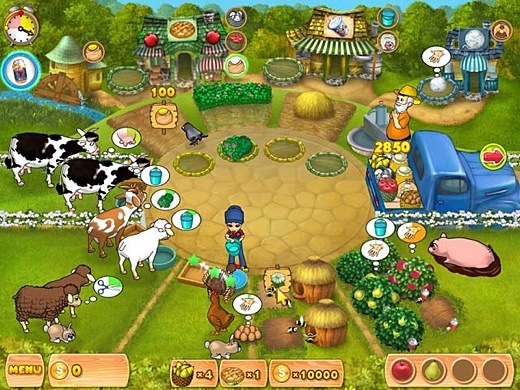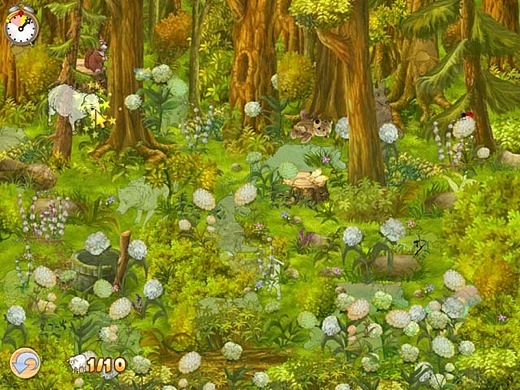SUBHEAD: We must redefine how we procure food, and more importantly, we must redefine our relationship with Nature.
By Jae Muzzin on 20 January 2010 in Info Shop News -
(http://news.infoshop.org/article.php?story=2010ag-production)

Image above: Screen shot of online game "Farm Mania" showing extolling agland production. From (http://www.bigfishgames.com/download-games/4307/farm-mania/index.html)
The historical contradiction of agriculture has always been how its proliferation destroys the ecological conditions which made its existence possible. As civilization has expanded, it has converted wilderness into grazing and farm land, and ultimately, barren desert.1 The natural world takes the form of a cycle, but civilized man has turned this cyclic process into a resource to exploit. Instead of a cycle, the nature-human relationship becomes a linear transfer of life and energy one way, and pollution and destruction the other way. “Agriculture is the birth of production... The land itself becomes an instrument of production and the planet’s species its objects.” 2
Unsurprisingly, this one-way conversion of life into production cannot last forever. Agriculture depletes the soil quickly, sometimes even depleting millennia old topsoil within two generations of farming.3 The inevitable decline of soil productivity has led to the mass adoption of hydrocarbon-based (natural gas) fertilizers.4 American capitalism (personified by the Rockefeller and Ford foundations, who hoped to squelch socialist upheavals)5 spread this practice to the “underdeveloped” world under the term Green Revolution, along with chemical pesticides, herbicides, hybrid seeds and more recently, biotechnology. Here capitalism averted agricultural and social disaster by piggy backing agriculture onto the ever more important energy resource, fossil fuels. As industrial-capitalism further developed, it became apparent that fossil fuels were just as finite as soil fertility, and the importance of peak oil (and natural gas) stems from our food system's dependence on fossil fuel.
The unsustainability of this arrangement becomes more apparent as productivity of farmland continues to decline. Since 1945, energy for agricultural use has increased about 4-fold while crop yields have increased about 3-fold.6 It was found that roughly 10 units of fossil fuel energy are required to produce 1 unit of food energy for human consumption.7 In pre-industrial societies, this ratio was reversed, with more energy being produced than was input.8
Our recent energy crisis with respect to agriculture may seem like a recent development, but it is in fact just the latest phase of a process as old as civilization itself. With the advent of agriculture there began a reversion in the soil building process, and topsoil levels where humans farmed began to decline.9 The transition from Earth-based Paleolithic humans to culture-based Neolithic humans saw the rise of the first ruling classes, the priests, kings, and bureaucrats. With the first states came the need to dominate, not only the under-classes whose labour supported the rulers and armies, but also the Earth whose resources could be converted to serve the state. The labouring person had to produce enough to provide for herself, as well as enough to support her lord and all his henchmen. This surplus is the starting point of exploitation, and the goal towards which all dominating societies align themselves. The drive for surplus is what distinguishes communities who grow food as part of a biological process, and Leviathans who grow food as part of a production process.
The pervasive lie of industrial progress is that its goal is to help humanity by increasing our population. Totalitarian systems of course have an interest in producing more soldiers, workers, and coordinators, but it sees these as instruments, not humans. Industry sees life as a means, not an end. Life only has worth if it serves an economic function. This is shown by the mass species die-off and the marginalization of poor and indigenous people in industrial-capitalist societies.
Modern capitalism is nothing more than the latest phase of civilization's quest to reap surplus from its labouring slaves and the Earth. Surplus is a man-made abstract concept, it doesn't exist in Nature. Nature always balances out excess, there is nothing it cannot recycle. It provides what is needed to sustain us, but nothing more and nothing less. Agriculture from its genesis has sought to reap more and more from Nature, not for the benefit of ordinary people, but the rulers who appropriate the excess to reinforce and expand their power.
Agriculture destroys Nature by replacing it with a system of production. An ecosystem perfected by millions of years of evolution is replaced with a human contrived food factory. This food factory recomposes some parts of the ecosystem, but ultimately fails in achieving the balance found in Nature. It fails because a system whose goal is surplus (known to capitalism as “profit”) can never achieve balance.
We now reach a point in our history when we can no longer avert the disaster inevitable in agriculture's march across the Earth. We must redefine how we procure food, and more importantly, we must redefine our relationship with Nature.

Image above: In another screen shot from Farm Mania "Nature" as portrayed as place where resources (sheep) are hidden and can be brought back for production. What is ever returned to nature in this arrangement?
[1] Vernon Gill Carter & Tom Dale, Topsoil And Civilization, (pp 6-7)
[2] John Zerzan, Elements of Refusal, Agriculture
[3] James H. Gray, Men Against the Desert, (p 5)
[4] Vernon Gill Carter & Tom Dale, Topsoil And Civilization, (p 252)
[5] Mark Dowie, American Foundations: An Investigative History, Cambridge, Massachusetts: MIT Press, 2001, (pp. 109-114)
[6] Food, Land, Population and the U.S. Economy, Executive Summary, Pimentel, David and Giampietro, Mario. Carrying Capacity Network, 11/21/1994. http://www.dieoff.com/page40.htm
[7] Eating Fossil Fuels, Dale Allen Pfeiffer, From the Wilderness Publications, http://www.fromthewilderness.com/free/ww3/100303_eating_oil.html
[8] Norman Church, Why Our Food is So Dependent on Oil, http://www.energybulletin.net/5045.html [9] Vernon Gill Carter & Tom Dale, Topsoil And Civilization, (p 6)
By Jae Muzzin on 20 January 2010 in Info Shop News -
(http://news.infoshop.org/article.php?story=2010ag-production)

Image above: Screen shot of online game "Farm Mania" showing extolling agland production. From (http://www.bigfishgames.com/download-games/4307/farm-mania/index.html)
The historical contradiction of agriculture has always been how its proliferation destroys the ecological conditions which made its existence possible. As civilization has expanded, it has converted wilderness into grazing and farm land, and ultimately, barren desert.1 The natural world takes the form of a cycle, but civilized man has turned this cyclic process into a resource to exploit. Instead of a cycle, the nature-human relationship becomes a linear transfer of life and energy one way, and pollution and destruction the other way. “Agriculture is the birth of production... The land itself becomes an instrument of production and the planet’s species its objects.” 2
Unsurprisingly, this one-way conversion of life into production cannot last forever. Agriculture depletes the soil quickly, sometimes even depleting millennia old topsoil within two generations of farming.3 The inevitable decline of soil productivity has led to the mass adoption of hydrocarbon-based (natural gas) fertilizers.4 American capitalism (personified by the Rockefeller and Ford foundations, who hoped to squelch socialist upheavals)5 spread this practice to the “underdeveloped” world under the term Green Revolution, along with chemical pesticides, herbicides, hybrid seeds and more recently, biotechnology. Here capitalism averted agricultural and social disaster by piggy backing agriculture onto the ever more important energy resource, fossil fuels. As industrial-capitalism further developed, it became apparent that fossil fuels were just as finite as soil fertility, and the importance of peak oil (and natural gas) stems from our food system's dependence on fossil fuel.
The unsustainability of this arrangement becomes more apparent as productivity of farmland continues to decline. Since 1945, energy for agricultural use has increased about 4-fold while crop yields have increased about 3-fold.6 It was found that roughly 10 units of fossil fuel energy are required to produce 1 unit of food energy for human consumption.7 In pre-industrial societies, this ratio was reversed, with more energy being produced than was input.8
Our recent energy crisis with respect to agriculture may seem like a recent development, but it is in fact just the latest phase of a process as old as civilization itself. With the advent of agriculture there began a reversion in the soil building process, and topsoil levels where humans farmed began to decline.9 The transition from Earth-based Paleolithic humans to culture-based Neolithic humans saw the rise of the first ruling classes, the priests, kings, and bureaucrats. With the first states came the need to dominate, not only the under-classes whose labour supported the rulers and armies, but also the Earth whose resources could be converted to serve the state. The labouring person had to produce enough to provide for herself, as well as enough to support her lord and all his henchmen. This surplus is the starting point of exploitation, and the goal towards which all dominating societies align themselves. The drive for surplus is what distinguishes communities who grow food as part of a biological process, and Leviathans who grow food as part of a production process.
The pervasive lie of industrial progress is that its goal is to help humanity by increasing our population. Totalitarian systems of course have an interest in producing more soldiers, workers, and coordinators, but it sees these as instruments, not humans. Industry sees life as a means, not an end. Life only has worth if it serves an economic function. This is shown by the mass species die-off and the marginalization of poor and indigenous people in industrial-capitalist societies.
Modern capitalism is nothing more than the latest phase of civilization's quest to reap surplus from its labouring slaves and the Earth. Surplus is a man-made abstract concept, it doesn't exist in Nature. Nature always balances out excess, there is nothing it cannot recycle. It provides what is needed to sustain us, but nothing more and nothing less. Agriculture from its genesis has sought to reap more and more from Nature, not for the benefit of ordinary people, but the rulers who appropriate the excess to reinforce and expand their power.
Agriculture destroys Nature by replacing it with a system of production. An ecosystem perfected by millions of years of evolution is replaced with a human contrived food factory. This food factory recomposes some parts of the ecosystem, but ultimately fails in achieving the balance found in Nature. It fails because a system whose goal is surplus (known to capitalism as “profit”) can never achieve balance.
We now reach a point in our history when we can no longer avert the disaster inevitable in agriculture's march across the Earth. We must redefine how we procure food, and more importantly, we must redefine our relationship with Nature.

Image above: In another screen shot from Farm Mania "Nature" as portrayed as place where resources (sheep) are hidden and can be brought back for production. What is ever returned to nature in this arrangement?
[1] Vernon Gill Carter & Tom Dale, Topsoil And Civilization, (pp 6-7)
[2] John Zerzan, Elements of Refusal, Agriculture
[3] James H. Gray, Men Against the Desert, (p 5)
[4] Vernon Gill Carter & Tom Dale, Topsoil And Civilization, (p 252)
[5] Mark Dowie, American Foundations: An Investigative History, Cambridge, Massachusetts: MIT Press, 2001, (pp. 109-114)
[6] Food, Land, Population and the U.S. Economy, Executive Summary, Pimentel, David and Giampietro, Mario. Carrying Capacity Network, 11/21/1994. http://www.dieoff.com/page40.htm
[7] Eating Fossil Fuels, Dale Allen Pfeiffer, From the Wilderness Publications, http://www.fromthewilderness.com/free/ww3/100303_eating_oil.html
[8] Norman Church, Why Our Food is So Dependent on Oil, http://www.energybulletin.net/5045.html [9] Vernon Gill Carter & Tom Dale, Topsoil And Civilization, (p 6)
No comments :
Post a Comment